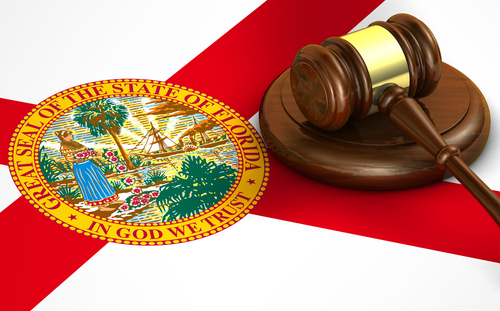Federal judge blocks Florida's ban on 'woke' instruction by public universities

Image from Shutterstock.
A federal judge in Florida has barred Florida education officials from enforcing provisions in a law that ban advancement of critical race theory by professors at public colleges and universities.
In a Nov. 17 opinion, Chief U.S. District Judge Mark E. Walker of the Northern District of Florida called the Individual Freedom Act “positively dystopian” and said it bans professors from expressing disfavored viewpoints in the classroom “while permitting unfettered expression of the opposite viewpoints.”
“The First Amendment does not permit the state of Florida to muzzle its university professors, impose its own orthodoxy of viewpoints, and cast us all into the dark,” Walker said.
Walker also said the law is “impermissibly vague” in violation of the 14th Amendment’s due process clause.
When Republican Florida Gov. Ron DeSantis first proposed the legislation, he had dubbed it the “Stop WOKE Act,” short for the Stop Wrongs to Our Kids and Employees Act.
At issue was a provision of the law that bans instruction that promotes or advances eight concepts. One of the banned concepts is that a “person’s moral character or status as either privileged or oppressed is necessarily determined by his or her race, color, national origin or sex.”
The law includes a “savings clause” that says the law doesn’t ban discussion of the eight concepts as part of a larger course of instruction that is “given in an objective manner without endorsement of the concepts.”
The law allows lawsuits by anyone aggrieved by violations and requires the board of governors of the state university system to adopt implementing regulations. Those regulations require universities to take disciplinary measures and fire employees, when appropriate, for violations of the law.
As an example of the reach of the law, Walker said one of the eight concepts bans views in favor of affirmative action. That would mean that, if the university invited U.S. Supreme Court Justice Sonia Sotomayor to speak, she would not be able to talk about how affirmative action opened doors for her at Princeton University and Yale University.
In Walker’s review of precedent, he said the Supreme Court “has never definitively proclaimed that ‘academic freedom’ is a stand-alone right protected by the First Amendment.”
Similarly, the 11th U.S. Circuit Court of Appeals at Atlanta has rejected the argument that academic freedom is an independent constitutional right.
But the 11th Circuit still recognizes that academic freedom is an important interest to consider, Walker said, citing the 1991 decision Bishop v. Aronov. It held that public universities can determine the content of curriculum, but classroom speech is protected absent a sufficient countervailing state interest.
Florida argued that it could also determine the state’s preferred viewpoint and exclude other viewpoints in university courses.
“But that is not the law,” Walker said.
“Simply because the state of Florida has great flexibility in setting curriculum, it cannot impose its own orthodoxy of viewpoint about the content it allowed within university classrooms,” Walker wrote.
Walker was appointed by former President Barack Obama.
Hat tip to Courthouse News Service, the Volokh Conspiracy, Politico, Law.com and How Appealing.
The state plans to appeal, according to the publications. The coverage also noted that the plaintiffs were represented by the Foundation for Individual Rights and Expression, an nonprofit civil liberties group, which issued a press release on the decision.
See also:
ABAJournal.com: “Federal judge temporarily blocks law banning ‘woke’ workplace training, compares Florida to ‘Stranger Things’”
Write a letter to the editor, share a story tip or update, or report an error.



